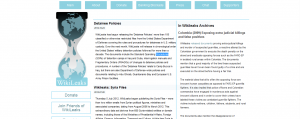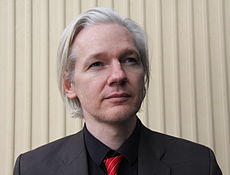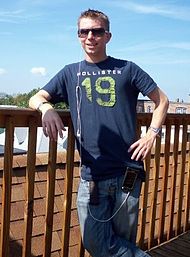WikiLeaks
WikiLeaks is a non-profit organization launched in 2007 that provides a platform for the anonymous submission of sensitive or classified information for publication[1]. As of 2011, WikiLeaks has been responsible for the publication of documents including military procedural manuals, diplomatic communication, and the suppression of journalistic freedom and freedom of speech.[1]
Given WikiLeaks' commitment to making government and corporate institutional activity more transparent, it has predictably been an object of scorn for many institutions around the world; as of late 2011, WikiLeaks had ceased publication due to a "blockade" by credit card companies, who had long been refusing to process donations intended for the organization[2]. Only weeks later, WikiLeaks founder Julian Assange lost an appeal against his extradition to Sweden to face allegations of rape[3], leaving the future of WikiLeaks uncertain. He was granted diplomatic asylum by Ecuador in June of 2012 and has been in their embassy in London since.[4]
The governmental and corporate response to WikiLeaks and the actions taken against Assange and others affiliated with the website come at a time of growing civilian unrest and demonstration against governmental and corporate suppression of human rights (i.e. the Arab Spring, the Occupy Movement, etc.)
The Wikileaks ideals of open and free information are not without critics. Various governments, including that of the United States, has claimed that the information posted on Wikileaks represents a national security threat domestically and also potential security breaches for covert agents overseas. That, combined with the possible illegality of posting sensitive information, makes for an immense ethical debate surrounding Wikileaks.
Contents
Key Figures
Julian Assange
Assange's youth was highly erratic; he and his mother were members of the controversial religious group "The Fellowship", also known as "The Family.[5]" After fleeing The Fellowship due to his mother's abusive boyfriend, he attended over thirty schools around Australia. Assange eventually found a niche as a hobbyist computer hacker, infiltrating (but not leaking information from) high-security government servers[5].
As an adult, Assange started the first ISP in Australia before moving into a publishing career with occasional forays into journalism, ultimately founding WikiLeaks[6].
After attracting sufficient worldwide attention through his work with WikiLeaks, Assange was arrested in late 2010 on a Swedish warrant stating he was wanted for questioning regarding allegations of rape. He served an ad hoc house arrest, wherein he was granted bail upon agreeing to be monitored, comply with a curfew, and forfeit his passport among other conditions, until his appeal to the extradition was rejected in November 2011. [7] In order to evade his extradition to Sweden on sexual molestation charges and question for a number of other investigations related to his WikieLeaks work, Assange applied for political asylum from the country of Ecuador in June 2012. Assange was admitted to the Ecuadorian embassy in London while he awaited a ruling on his Ecuadoran asylum case.[8] In August of the same year Assange received his political asylum from the Ecuadoran government, but was and still is unable to leave the Ecuadoran Embassy for fear of immediate arrest by United Kingdom authorities.[9] As of April 2016 Jullian Assange remains confined in the Ecuadorian embassy he entered in June 2012. [10]
Assange claims that "[Exposing injustice] is something that I find meaningful and satisfying. That is my temperament. I enjoy creating systems on a grand scale, and I enjoy helping people who are vulnerable. And I enjoy crushing bastards. So it is enjoyable work." [11]
Bradley E. Manning
Bradley Manning is a former Army Analyst Private First Class. He was arrested in May 2010 while serving in Iraq with the US Army following suspicion that he had submitted classified documents to WikiLeaks[12]. Manning's leaks included 260,000 diplomatic cables, 90,000 intelligence reports and a video of an American Apache firing at Reuters Journalists whom they had mistaken for insurgents. He was able to acquire the thousands of documents by copying information onto a floppy disk he claimed to be a Lady Gaga CD [13]
Leading up to his arrest, Manning confessed his crimes to renowned former hacker Adrian Lamo through instant messages. Lamo had sworn that their conversation was private, but reported Manning to the FBI soon after learning the severity of Manning's involvement [14]. In the aftermath, a media blitz ensued and, given his status as a US soldier, Manning became a household name. He continues to serve as an important figure for WikiLeaks supporters in attempts at showcasing governmental self-interest and cruelty. There have been numerous reports of his declining health[15] as well as speculation over the potential illegality of the conditions in which Manning was kept. From July 2010 to April 2011, he was held in solitary confinement and was kept in his cell upwards of 21 hours a day on average at the Quantico military base in Virginia. [16] In March 2011, President Obama defended the treatment Manning received at the prison, claiming that the Pentagon told him that Manning's treatment had been "meeting our basic standards." [17]
Structure
Wikileaks organizational model is based on the collective action of anonymous submission. Anonymous submission in Wikileaks acts as the foundation for Wikileak's informational infrastructure which stems from a branch of cyberactivism called leaking. This branch of cyberactivism, works to exploit existing online infrastructures to create an environment to release confidential informational points to shift the power dynamic of political of social change to the members of the online environment. Wikileaks actively works as an environment for cloud protest through utilizing collective anonymity. [18]. This process is kept anonymous and ensured through an anonymous dropbox system. The organization's journalists then analyze the data submitted, verify its validity, and write a news story to describe its societal significance. This news story and the original information submitted is then released through Wikileaks' servers.
During Wikileaks' editorial process, some or all aspects of submitted information may be removed or may have its information's release delayed. The organization states that this is done to "protect life and limb of innocent people." [19] With that said, Assange has also stated that the potential for various Wikileaks to save lives ultimately outweighs the potential that a few innocent individuals may be harmed [20].
"Cablegate"
Wikileaks began releasing United States Embassy Cables in a collection now referred to as "Cablegate." The organization has stated that the number of cables in this collection is 251,287, which is the largest set of confidential documents to ever be released to the public. The cables date from December 1966 to February 2010. The U.S. government and governments around the world condemned the release of these documents due to their sensitive material. The international outcry from governments led to financial institutions preventing their own services from assisting in Wikileaks' donation collection process.
The United States' Response
After Cablegate began, President Obama's office condemned these actions. The White House released a statement saying, "Such disclosures put at risk our diplomats, intelligence professionals, and people around the world who come to the United States for assistance in promoting democracy and open government. President Obama supports responsible, accountable, and open government at home and around the world, but this reckless and dangerous action runs counter to that goal."[21]
Secretary of State, Hilary Clinton, offered a similar warning against Cablegate and other such leaks in diplomatic communications, saying "it is an attack on the international community: the alliances and partnerships, the conversations and negotiations that safeguard global security and advance economic prosperity." [22] There has been talk about the United States prosecuting both Wikileaks and Assange on the grounds that both encourage theft of government property[23].
Financial Blockade
Beginning on December 7, 2011, a financial blockade from many of the United States' largest financial institutions began.[24] This is believed to have been initiated by people within the United States' government, which were unhappy with Wikileaks' release of US Embassy cables. Bank of America was a specific institution that refused to process any transactions that they believed had anything to do with Wikileaks. A consequence of this action was initiated by the group Anonymous. The group hacked into Bank of America's systems and gathered the correspondence that took place between HBGary Federal (a law firm hired by Bank of America to investigate and prosecute Assange and Wikileaks), in which it was revealed that the bank and law firm were willing to use unlawful actions to ensure that a successful charge was brought against the group.[25]
Ethical Issues
WikiLeaks has brought a number of ethical issues across a wide array of subject areas to the world's attention. WikiLeaks claims to be working against corruption and towards transparency, which both seem to align with the values of a Democratic government. However, much of the information released derives from sensitive government information, and as a result there have been many efforts to restrict WikiLeaks functions. Questions arise in how much information governments should release to the public, and what information is necessary to participate in a democracy.
Anonymity
WikiLeaks realized the impact of information transparency with the data that is published on the site, and insures anonymity of sources. Information is transmitted through an anonymous drop box, and does not retain logs. [26] The segregated servers also make sure that the server cannot track the source without co-ordination across all of the site's servers internationally. However, in 2011, Rudolf Elmer, a former Swiss banker, submitted information of account details help by prominent people, including that the information is to be vetted though it would be publicly available in the future. [27] In this case, it is unknown if the source was leaked through a failure in the anonymity system of WikiLeaks, or if consent was given to publish the information using the source name. Though the website assures that the sources are checked to be reliable, the repercussions of an accidental release profiling the source could be costly for the individual or organization. The records affected the reputation of several stakeholders, and Elmer could have undergone threats on his job security or even his life regarding the extremely sensitive information published.
Privacy
WikiLeaks has also made the dropbox accessible past governments that block access through alternate domain names without 'WikiLeaks' in them. However, these sites are only verified by the WikiLeaks certification. Therefore, in a case where the cover domain name overlaps with the WikiLeaks sponsored one, there exists a risk of whistleblowing on a server where the sensitive information submitted can be used for other uses besides strictly informational purposes.
Whistleblowing
Whistleblowing is term used to describe calls to check for corruption, usually referred to in a global political scope. Whistleblowers are witnesses of corruption; they serve as invaluable resources to keep companies, organizations, and the government in check and can save many people's lives, time, and resources. Legislation and policy of this sort is implemented into larger and usually more powerful organization where people usually remain silent about corruption if it is not spoken out against. In Europe, there is an "Alternative to Silence" Project sponsored by the European Commission to encourage legislation and analysis of the weaknesses of whistle-blowing policies and the improvements that can be made. [28]
The Obama administration has taken definite actions in the past to protect whistleblowers or defend their actions[29][30]. However, in the case of WikiLeaks the US government finds itself in the position of having sensitive information exposed, and the severity of Manning's detention is a clear indication that the Obama administration is not willing to tolerate such action. The administration's clear support of a murdered Russian whistleblower in banning several Russian officials affiliated with the murder from entering the US[29] demonstrates apparent hypocrisy; leaking details of gross misbehavior on the part of other countries is an admirable act in its consideration by the United States, but detailing gross misbehavior by the US itself is treason. The case is especially complicated, as Obama signed a bill into law on November 27, 2012 that provided attentional protections for whistleblowers. As the administration charged Manning with more crimes, the most serious of which was "aiding the enemy," Manning's lawyer suggested that the President's actions were hypocritical. [31]
This case could set a precedent for future cases involving whistleblowers, even with the additional protection granted by the newly signed law. The uncertainty surrounding whether leaking information is aiding an enemy or whistleblowing to uncover government misdeeds makes it possible for people presenting or distributing any kind of clandestine government information to be charged with a crime.
Information Transparency
It remains a point of discussion whether Wikileaks' release of diplomatic cables, logs from the United States' military presence in Iraq, and other released documents creates more benefit for society than harm. The United States' government was distressed by the release of its diplomatic cables in "cablegate," stating that its potential to cause harm the nation and individuals. However, some academics, including Luciano Floridi and Matteo Turilli have stated that transparency is not an ethical principle in itself but a proethical condition for enabling or impairing other ethical practices or principles [32]. The amount of donations the organization received in 2010, over 1,000,000 Euros[33], it is clear that global interest in classified government information is high. As this debate continues to permeate society beyond government figureheads and academics, citizens of the United States and nations around the world will have to decide how much transparency is acceptable and if leaks, such as those collected by Wikileaks, are the best method for distributing this information.
The Second State
The confinement of Julian Assange to Ecuador's embassy in Great Brittan in 2012 allowed him to pen the book The Cypher Punks. In an December interview on CNN Assange reiterated his expressed core belief that democracy rots behind secrecy. He stated: the United States moves to this end through the creation of a second state composed of the select few, roughly 500,000 people, with security clearance. This second state is formed by an information divide which arises between those with expressed access to government classified information and those without. This problem has been further exacerbated by the war on terror. An existential war which has seen, on a greater scale, the arbitrary classification of information through out this time under the President's state secrets perogative.
See also
External Links
References
- ↑ 1.0 1.1 WikiLeaks.org
- ↑ Hope, Christopher: WikiLeaks' money woes brings end to leak of secrets. The Telegraph (UK) 24 October 2011
- ↑ Larson, Erik: WikiLeaks founder Assange to be extradited to Sweden to face rape claim. The Washington Post 2 November 2011
- ↑ http://en.wikipedia.org/wiki/Julian_Assange#cite_note-asylumgranted-16
- ↑ 5.0 5.1 Welch, Dylan: Inside the strange world of Julian Assange. Sydney Morning Herald 15 October 2011
- ↑ Greenberg, Andy: An Interview With WikiLeaks' Julian Assange. Forbes 29 November 2010
- ↑ extradition
- ↑ Topping, A.; Malik, S.; Batty, D. (2012). "Julian Assange requests asylum at Ecuador embassy". The Guardian. http://www.theguardian.com/media/2012/jun/20/julian-assange-asylum-ecuador-embassy-live
- ↑ Ferran, L. & Bruner, R. (2012) "Ecuador grants WikiLeaks founder Julian Assange political asylum". ABC News. http://abcnews.go.com/Blotter/ecuador-grants-wikileaks-founder-assange-political-asylum/story?id=17018133
- ↑ Pulver, A. (2016). “Laura Poitras's Julian Assange documentary to premiere at Cannes”. The Guardian. http://www.theguardian.com/film/2016/apr/19/cannes-festival-directors-fortnight-julian-assange-laura-poitras
- ↑ Julian Assange in an interview with Der Spiegel (Germany) 26 July 2010
- ↑ United States Division-Center release No. 20100706-01
- ↑ Bradley Manning. (2011, March 3). New York Times.
- ↑ http://www.wired.com/threatlevel/2011/07/manning-lamo-logs/
- ↑ Brooke, Heather: Bradley Manning's health deteriorating in jail, supporters say. The Guardian (UK) 16 December 2010
- ↑ http://www.politico.com/story/2012/12/manning-lawyer-military-actions-criminal-84547.html
- ↑ http://www.dailymail.co.uk/news/article-1365493/Pentagon-tells-Obama-Bradley-Mannings-prison-treatment-appropriate--gets-just-hour-outside-cell.html
- ↑ Milan, Stefania. “WikiLeaks, Anonymous, and the Exercise of Individuality: Protesting in the Cloud.” Beyond WikiLeaks, 2013, pp. 191–208., doi:10.1057/9781137275745_12.
- ↑ http://wikileaks.org/About.html
- ↑ ^ WikiRebels the Documentary (Television production). Stockholm: Sveriges Television. December 2010. (35:45 to 36:03)
- ↑ http://www.bbc.co.uk/news/world-us-canada-11858895
- ↑ http://content.usatoday.com/communities/theoval/post/2010/11/obamas-team-faces-sensitive-diplomacy-over-wikileaks/1
- ↑ Entous, Adam; Perez, Evan (21 August 2010). "Prosecutors Eye WikiLeaks Charges". The Wall Street Journal (New York). Retrieved 11 December 2011.
- ↑ http://wikileaks.org/Banking-Blockade.html
- ↑ Lundin, Leigh (20 February 2011). "WikiLicks". Crime. Orlando: Criminal Brief.
- ↑ http://www.wikileaks.org/About.html
- ↑ http://en.wikipedia.org/wiki/WikiLeaks
- ↑ http://www.transparency.org/whatwedo/activity/our_work_on_whistleblowing. Transparency International, 2012
- ↑ 29.0 29.1 Lally, Kathy: U.S. puts Russian officials on visa blacklist. The Washington Post 25 July 2011
- ↑ Abrams, Jim: Congress moves to protect Peace Corps volunteers. Associated Press 1 November 2011
- ↑ http://www.huffingtonpost.com/2012/12/04/bradley-manning-obama-whistleblower_n_2238383.html
- ↑ Turilli Floridi Information Transparency 2009.pdf
- ↑ http://cryptome.org/0003/wl-finance-en.pdf



